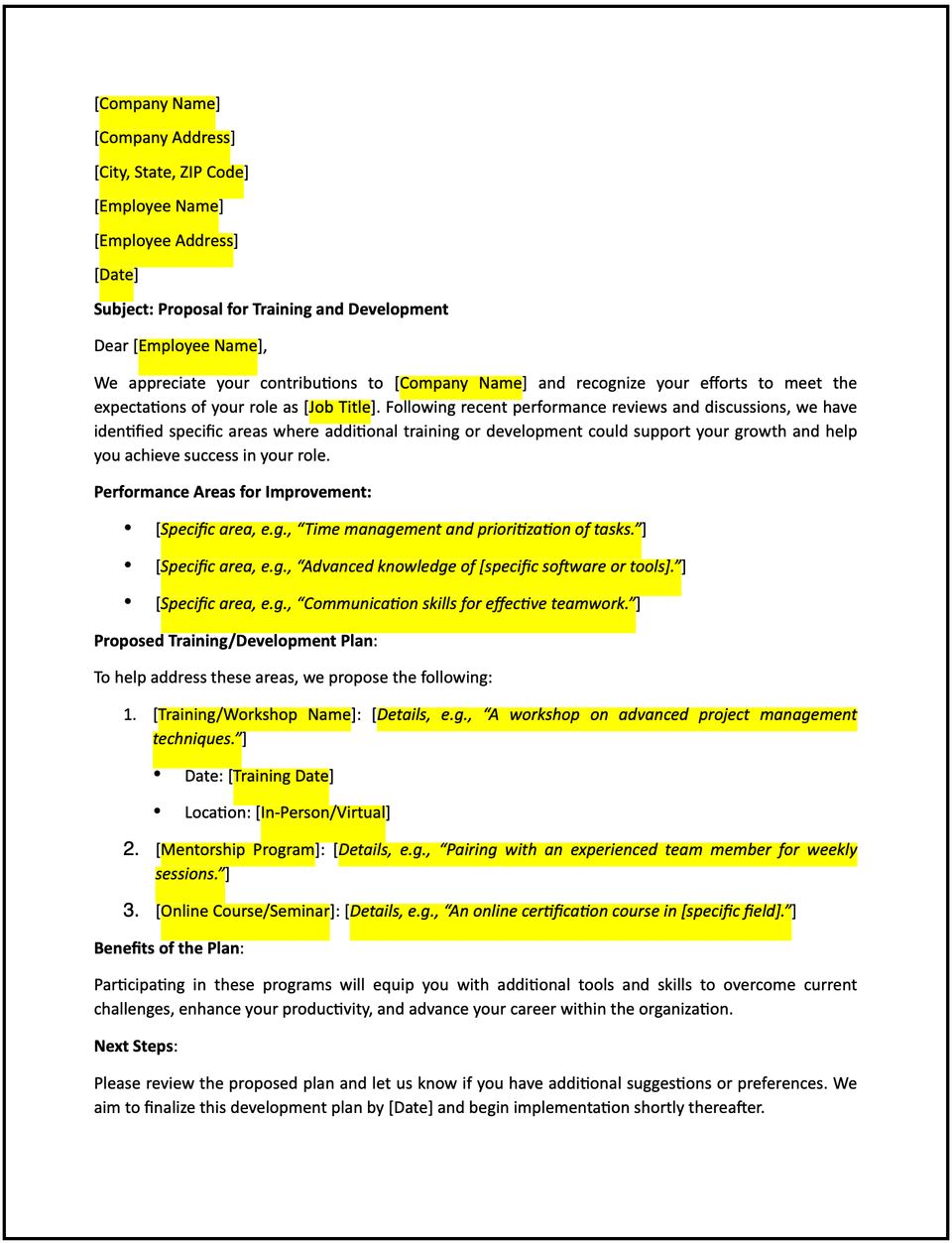Letter proposing training or development to address performance gaps: Free template

Letter proposing training or development to address performance gaps
A letter proposing training or development to address performance gaps is a formal way to encourage an employee to improve their skills and address specific areas of concern. This letter emphasizes support, outlines the proposed development plan, and fosters collaboration for better performance.
How to use this letter proposing training or development to address performance gaps
- Open with context: Begin by referencing recent performance discussions or evaluations that identified areas for improvement.
- Acknowledge strengths: Highlight the employee’s strengths and contributions to balance the message.
- State the proposal: Clearly explain the suggested training or development opportunities, including specific programs, courses, or mentorship.
- Describe the goals: Outline how the proposed plan addresses the identified performance gaps and benefits both the employee and the organization.
- Provide details: Include information about the training format, duration, costs (if applicable), and timelines.
- Offer support: Reaffirm the organization’s commitment to the employee’s growth and success, and express confidence in their potential.
- Maintain a professional and encouraging tone: Ensure the letter is supportive, respectful, and focused on collaboration.
- Provide contact information: Include details for further discussions or to address questions about the proposal.
Benefits of using a letter proposing training or development to address performance gaps
This letter template ensures a structured and professional way to encourage development while fostering motivation and clarity. Here’s how it helps:
- Promotes growth: Offering training demonstrates the organization’s investment in the employee’s development.
- Encourages improvement: Addressing performance gaps constructively fosters motivation and engagement.
- Reflects professionalism: A well-crafted proposal reinforces the organization’s commitment to its employees.
- Supports alignment: Clear communication ensures the employee understands expectations and goals.
- Provides documentation: A formal record of the proposal is valuable for HR and performance management.
Tips for writing an effective letter proposing training or development to address performance gaps
- Be specific: Clearly describe the identified performance gaps and the proposed training or development solutions.
- Use professional language: Maintain a supportive and encouraging tone to foster collaboration.
- Highlight benefits: Explain how the training will improve performance and benefit the employee’s career.
- Include logistics: Provide details about the program, including timelines, costs, and how to participate.
- Keep it concise: Focus on the key points while ensuring the tone is positive and professional.
Frequently asked questions (FAQs)
Q: What details should I include in this letter?
A: Include the identified performance gaps, the proposed training or development plan, its benefits, and logistical details.
Q: Should I personalize the letter?
A: Yes, addressing the employee directly and referencing specific needs ensures clarity and attentiveness.
Q: Who typically sends this letter?
A: The employee’s manager, supervisor, or an HR representative usually sends this letter.
Q: How formal should this letter be?
A: The tone should be professional yet supportive, focusing on growth and encouragement.
Q: When should this letter be sent?
A: Send the letter promptly after identifying the performance gaps and selecting appropriate training options.
Q: Can this letter include alternative training options?
A: Yes, suggesting multiple options allows flexibility and demonstrates a tailored approach.
Q: Is acknowledgment from the recipient required?
A: While not mandatory, requesting acknowledgment ensures the employee understands and agrees with the proposal.
This article contains general legal information and does not contain legal advice. Cobrief is not a law firm or a substitute for an attorney or law firm. The law is complex and changes often. For legal advice, please ask a lawyer.


